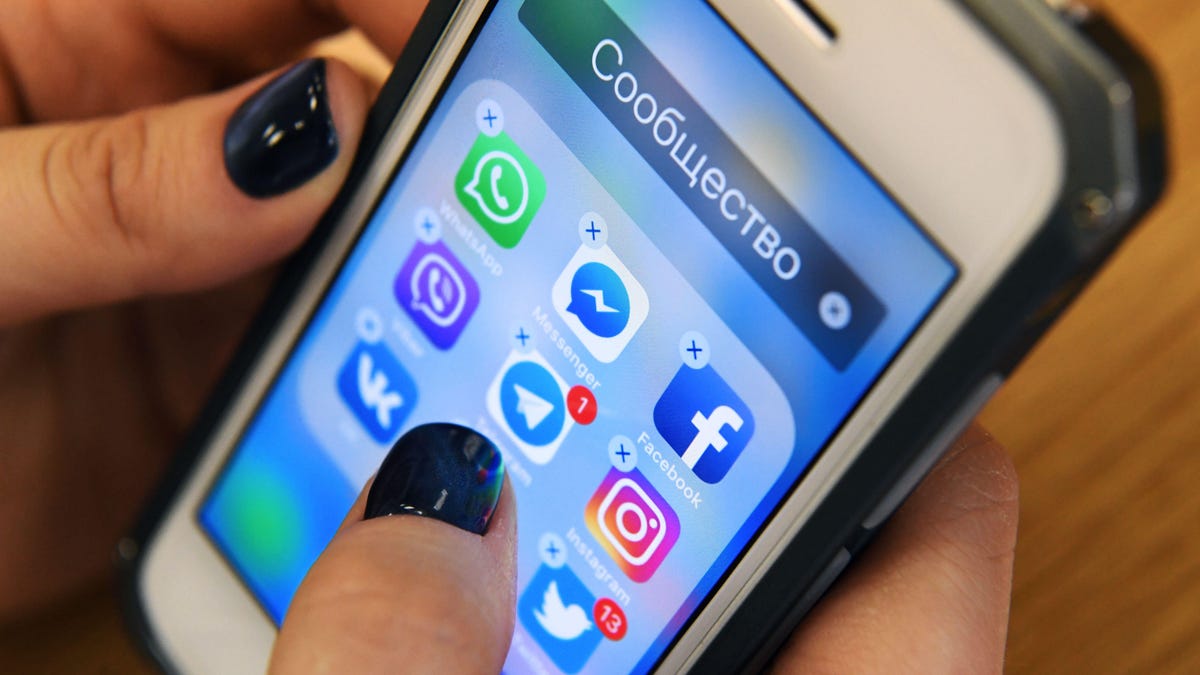Tech giants met with US intelligence officials over midterm elections
But representatives from Apple, Facebook, Google and Twitter, among others, got little information on preparations under way, The New York Times reports.

The icons for social networking apps Facebook, Instagram, Twitter and others as seen on a smartphone screen in Moscow.
Some of the tech industry's most influential companies are apparently mobilizing in an effort to avoid a repeat of the Russian meddling that occurred during the 2016 US election.
Representatives from Amazon , Apple , Google , Facebook , Microsoft , Oath, Snap and Twitter , met last month with representatives of the US intelligence community to discuss preparations for the midterm elections, The New York Times reported Monday. The meeting, which Facebook confirmed it hosted, was the first discussion between tech companies and intelligence officials on the topic since Russian operatives used social media to sow seeds of discord among Americans during the 2016 election.
But the meeting's atmosphere was described as tense and sharing of information was one-sided, three unidentified sources told the newspaper. While tech companies presented details about disinformation campaigns they saw waged on their platforms, the FBI and Department of Homeland Security were reportedly unable or unwilling to share information about the threats tech companies could anticipate in the upcoming elections.
Disinformation has long been a part of Russia's foreign policy strategy, and social media has allowed the trolling effort to expand on a viral scale. US intelligence has warned Congress that these campaigns will continue in future elections.
Facebook, Twitter and Google have been scrutinized in recent months by Congress after US intelligence agencies determined that the Russian government had used these platforms to disseminate false news and advertisements in an attempt to influence US elections in 2016. Earlier this year, representatives of Google, Facebook and Twitter told Congress the companies had learned important lessons during the presidential election and pledged more transparency going forward.
Russians used stolen identities to pose as Americans on Facebook and Instagram, creating Facebook groups, buying divisive ads and posting inflammatory images, according to an indictment unsealed in February that charged 13 Russian nationals and three Russian groups with interfering with the 2016 presidential election.
The Justice Department's indictment called out the Internet Research Agency, a group linked to Russian propaganda efforts across social media. Employees for the IRA created troll accounts and used bots to stage arguments and sow political chaos during the 2016 campaign.
The Russian trolling campaigns aimed at the US involved people posing as advocates on hot-button issues, like Black Lives Matter protesters, gun rights groups and LGBT issues. Meanwhile, Russian trolls "uploaded over a thousand videos to YouTube on 18 different channels," Google representatives told Congress.
Twitter told Congress in January it created a task force to handle issues that come up during the midterm elections in November. The plans include verifying the accounts of major party candidates to prevent copycats, working with federal and state election officials to monitor problems and improving its algorithm to eliminate fake accounts with election-related content.
On Monday, Apple said it would add a 2018 midterm elections section to its News app, promising US readers curated content through November. Facebook said in March its midterm elections defense strategy would focus on four areas: fighting foreign interference, removing fake accounts, increasing ad transparency and reducing the spread of fake news.
Neither the FBI and Department of Homeland Security, nor the companies identified as attending Facebook's meeting, immediately responded to requests for comment.
Security: Stay up-to-date on the latest in breaches, hacks, fixes and all those cybersecurity issues that keep you up at night.
Blockchain Decoded: CNET looks at the tech powering bitcoin -- and soon, too, a myriad services that will change your life.

